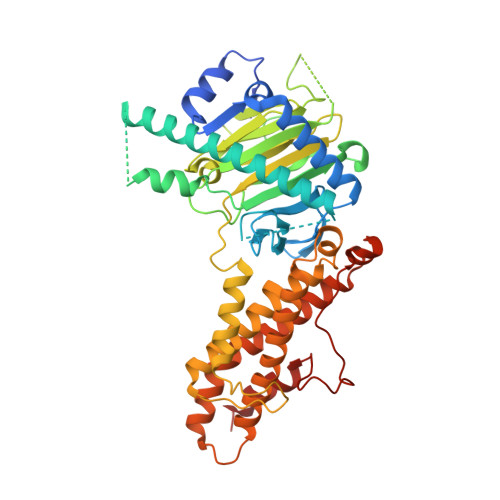Small-Molecule Targeting of Oncogenic FTO Demethylase in Acute Myeloid Leukemia.
Huang, Y., Su, R., Sheng, Y., Dong, L., Dong, Z., Xu, H., Ni, T., Zhang, Z.S., Zhang, T., Li, C., Han, L., Zhu, Z., Lian, F., Wei, J., Deng, Q., Wang, Y., Wunderlich, M., Gao, Z., Pan, G., Zhong, D., Zhou, H., Zhang, N., Gan, J., Jiang, H., Mulloy, J.C., Qian, Z., Chen, J., Yang, C.G.(2019) Cancer Cell 35: 677-691.e10
- PubMed: 30991027
- DOI: https://doi.org/10.1016/j.ccell.2019.03.006
- Primary Citation of Related Structures:
6AKW - PubMed Abstract:
FTO, an mRNA N 6 -methyladenosine (m 6 A) demethylase, was reported to promote leukemogenesis. Using structure-based rational design, we have developed two promising FTO inhibitors, namely FB23 and FB23-2, which directly bind to FTO and selectively inhibit FTO's m 6 A demethylase activity. Mimicking FTO depletion, FB23-2 dramatically suppresses proliferation and promotes the differentiation/apoptosis of human acute myeloid leukemia (AML) cell line cells and primary blast AML cells in vitro. Moreover, FB23-2 significantly inhibits the progression of human AML cell lines and primary cells in xeno-transplanted mice. Collectively, our data suggest that FTO is a druggable target and that targeting FTO by small-molecule inhibitors holds potential to treat AML.
Organizational Affiliation:
State Key Laboratory of Drug Research, Shanghai Institute of Materia Medica, Chinese Academy of Sciences, Shanghai 201203, China; University of the Chinese Academy of Sciences, Beijing 100049, China.
















